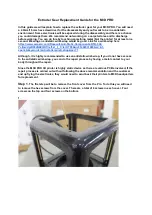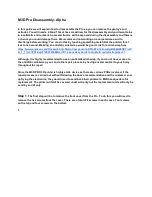
88
GraverSmith
OPERATION
STROKES PER MINUTE (SPM)
Stroke speed is a matter of personal
preference and experience. The SPM dial
(FIG. 4.A) settings are approximate and
range from 400–8,000 SPM.
Lower speeds are used for stippling,
matting, and similar techniques.
Mid-range speeds are used for
maximum-power tasks. Higher speeds
are used for fi ne cuts and fi nishes.
Experiment with the settings to better
understand how the SPM relates to
technique.
FINE ADJUSTMENTS FOR
HANDPIECE OPERATION
PROPERLY ADJUSTING THE
ENGRAVING SYSTEM IS THE SINGLE
MOST IMPORTANT OPERATION TO
LEARN.
Each handpiece has a normal
SPM range. Operating outside this range
can produce erratic results.
SPECIAL NOTE: When powered on,
the system pushes a small amount of
air through the electrically-controlled
air solenoid valve. When powered off,
the system seals the valve, making a
“pop” and “hiss” sound. This allows the
system to be powered off while the air
compressor remains on—without loss of
air in the compressor tank.
• Power on the air compressor
and allow tank to fi ll.
Wait for the
compressor to cycle off.
• Power on the GraverSmith™.
• Turn the SPM dial (FIG. 4.A) to 2300.
Turn the primary air pressure control
knob (FIG. 4.B) clockwise until the
air pressure gauge displays 5 psi
(0.4 bar).
• Hold the selected handpiece
vertically near either ear as shown
in FIG. 5.
•
WITHOUT operating the throttle,
slowly increase the air pressure until
the handpiece begins to buzz. The
handpiece will vibrate, then knock,
as the pressure increases. Stop
adding air pressure immediately
after the knocking stops. This is the
perfect air pressure operating range
for the selected handpiece model.
See chart on page 9 for an alternative
adjustment method.
A
B
FIG. 4 • Primary Control Knob
A. Strokes Per Minute (SPM) dial
B. Primary air pressure control knob
FIG. 5










































